This text is intended for novice testers who want to understand how to make reports on allure with the history of tests, and also explain where to store them so that any member of your team can look into the report.
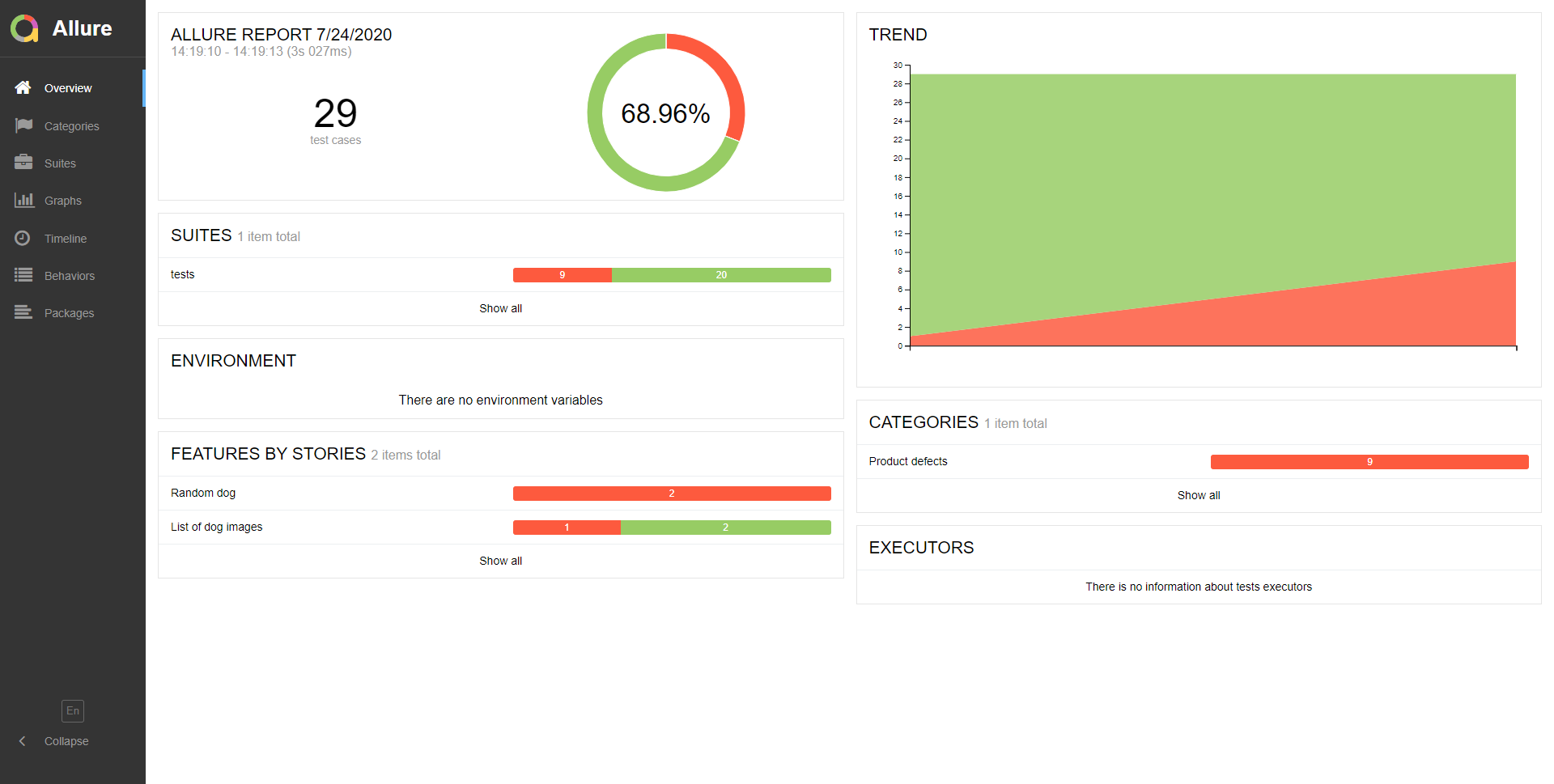
Working repository with final working code and infrastructure
Link to reports after running tests
gitlab python, allure, docker, , . , , , . allure, . , UI , .
. , . windows, .
, python, , . pytest, , , . Dog API. gitlab, docker.
, :
- Python
- Allure . .
- PyCharm Community
- ssh git gitlab
- Pytest —
- API
- allure
- Gitlab Runner
- .gitlab-ci.yml
- UI
allure_pages .
:
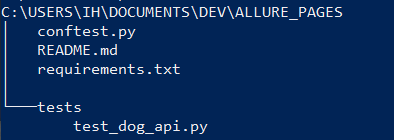
conftest.py—requirements.txt— pythontest_dog_api.pytests
, . :
python -m venv venv
PyCharm
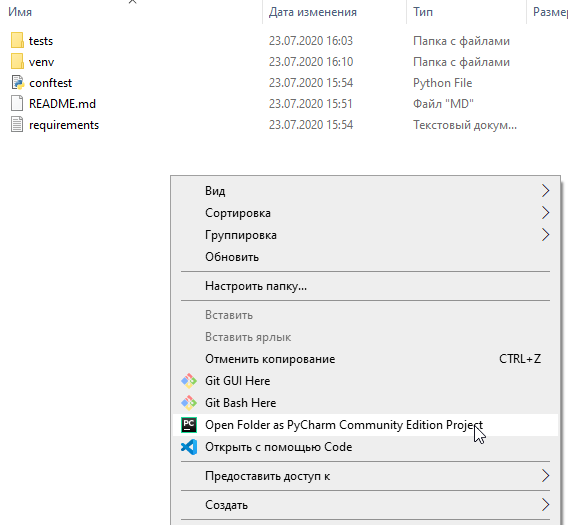
, PyCharm . , .
-
Add Interpreter, PyCharm ,
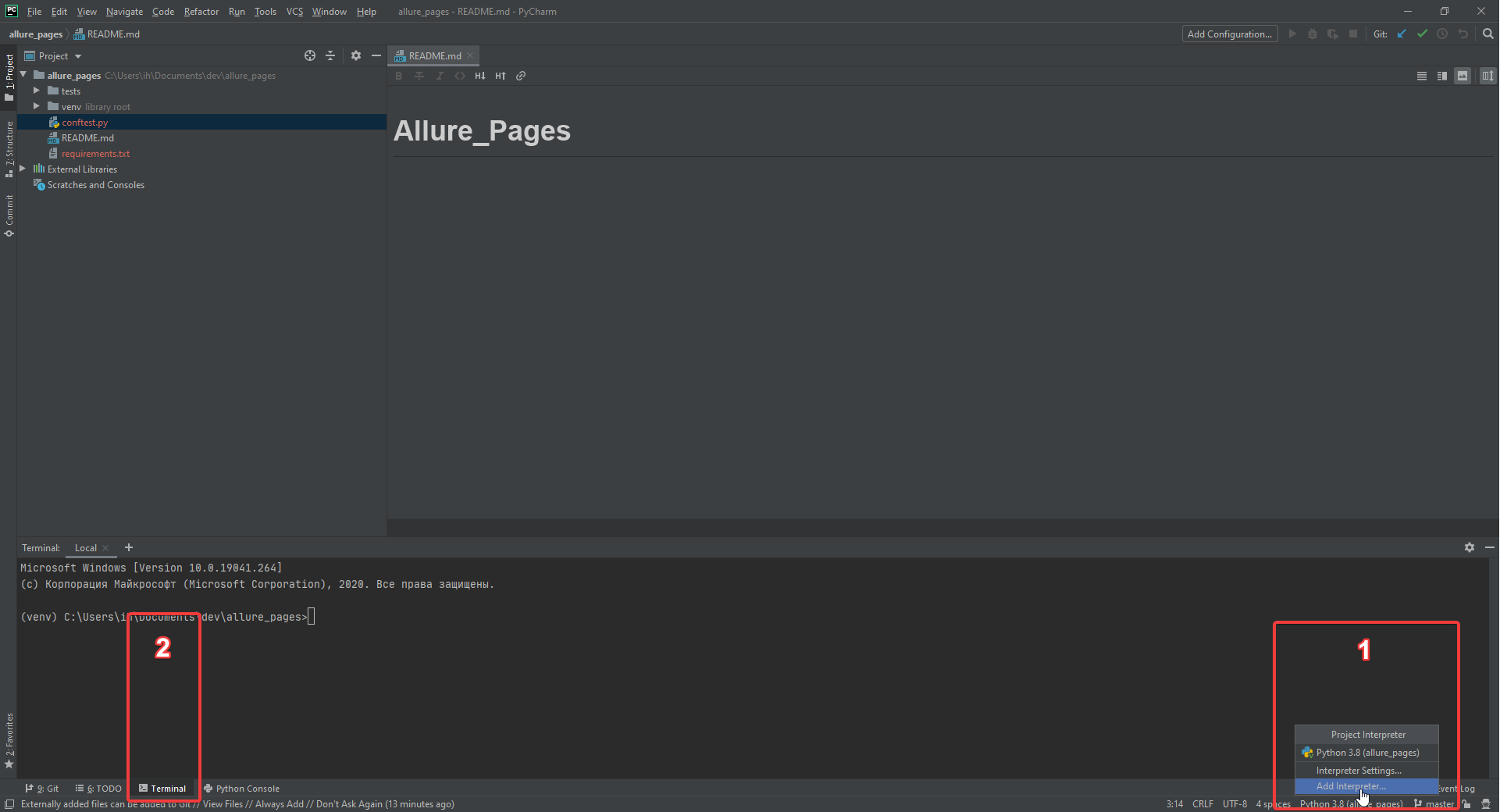
:
.
pip install requests— , Dog Apipip install pytest— ,pip install pytest-xdist—pip install allure-pytest— allure
pip freeze > requirements.txt.
requirements.txt.
, requirements.txt
allure-pytest==2.8.18 pytest==6.0.1 pytest-xdist==2.1.0 requests==2.24.0
API
, GET POST . . , . .
@pytest.fixture
def dog_api():
return ApiClient(base_address="https://dog.ceo/api/") . base_address, https://dog.ceo/api/. , GET POST .
class ApiClient:
def __init__(self, base_address):
self.base_address = base_addressGET .
def get(self, path="/", params=None, headers=None):
url = f"{self.base_address}{path}"
return requests.get(url=url, params=params, headers=headers) , requests. ApiClient path, params, headers get , requests.get(url=url, params=params, headers=headers). . , , , , requests.get.
POST. , , .
def post(self, path="/", params=None, data=None, json=None, headers=None):
url = f"{self.base_address}{path}"
return requests.post(url=url, params=params, data=data, json=json, headers=headers)conftest.py:
import pytest
import requests
class ApiClient:
def __init__(self, base_address):
self.base_address = base_address
def post(self, path="/", params=None, data=None, json=None, headers=None):
url = f"{self.base_address}{path}"
return requests.post(url=url, params=params, data=data, json=json, headers=headers)
def get(self, path="/", params=None, headers=None):
url = f"{self.base_address}{path}"
return requests.get(url=url, params=params, headers=headers)
@pytest.fixture
def dog_api():
return ApiClient(base_address="https://dog.ceo/api/")
Dog API . , . , . , . , . test_dog_api.py
import pytest
def test_get_random_dog(dog_api):
response = dog_api.get("breeds/image/random")
with allure.step(" , "):
assert response.status_code == 200, f" , {response.status_code}"
with allure.step(" . json ."):
response = response.json()
assert response["status"] == "success"
with allure.step(f" {response}"):
with allure.step(f" "):
with allure.step(f" - "):
pass
@pytest.mark.parametrize("breed", [
"afghan",
"basset",
"blood",
"english",
"ibizan",
"plott",
"walker"
])
def test_get_random_breed_image(dog_api, breed):
response = dog_api.get(f"breed/hound/{breed}/images/random")
response = response.json()
assert breed in response["message"], f" , {response}"
@pytest.mark.parametrize("file", ['.md', '.MD', '.exe', '.txt'])
def test_get_breed_images(dog_api, file):
response = dog_api.get("breed/hound/images")
response = response.json()
result = '\n'.join(response["message"])
assert file not in result, f" {file}"
@pytest.mark.parametrize("breed", [
"african",
"boxer",
"entlebucher",
"elkhound",
"shiba",
"whippet",
"spaniel",
"dvornyaga"
])
def test_get_random_breed_images(dog_api, breed):
response = dog_api.get(f"breed/{breed}/images/")
response = response.json()
assert response["status"] == "success", f" {breed}"
@pytest.mark.parametrize("number_of_images", [i for i in range(1, 10)])
def test_get_few_sub_breed_random_images(dog_api, number_of_images):
response = dog_api.get(f"breed/hound/afghan/images/random/{number_of_images}")
response = response.json()
final_len = len(response["message"])
assert final_len == number_of_images, f" {number_of_images}, {final_len}"
allure
allure. , . , .
with allure.step('step 1'): — , .
@allure.feature('Dog Api') @allure.story('Send few requests') — ,
allure, . allure,
API allure .
class ApiClient:
def __init__(self, base_address):
self.base_address = base_address
def post(self, path="/", params=None, data=None, json=None, headers=None):
url = f"{self.base_address}{path}"
with allure.step(f'POST request to: {url}'):
return requests.post(url=url, params=params, data=data, json=json, headers=headers)
def get(self, path="/", params=None, headers=None):
url = f"{self.base_address}{path}"
with allure.step(f'GET request to: {url}'):
return requests.get(url=url, params=params, headers=headers). , . . .
@allure.feature('Random dog')
@allure.story(' ')
def test_get_random_dog(dog_api):
response = dog_api.get("breeds/image/random")
with allure.step(" , "):
assert response.status_code == 200, f" , {response.status_code}"
with allure.step(" . json ."):
response = response.json()
assert response["status"] == "success"
with allure.step(f" {response}"):
with allure.step(f" "):
with allure.step(f" - "):
pass
. test_dog_api.py
import pytest
import allure
@allure.feature('Random dog')
@allure.story(' ')
def test_get_random_dog(dog_api):
response = dog_api.get("breeds/image/random")
with allure.step(" , "):
assert response.status_code == 200, f" , {response.status_code}"
with allure.step(" . json ."):
response = response.json()
assert response["status"] == "success"
with allure.step(f" {response}"):
with allure.step(f" "):
with allure.step(f" - "):
pass
@allure.feature('Random dog')
@allure.story(' ')
@pytest.mark.parametrize("breed", [
"afghan",
"basset",
"blood",
"english",
"ibizan",
"plott",
"walker"
])
def test_get_random_breed_image(dog_api, breed):
response = dog_api.get(f"breed/hound/{breed}/images/random")
with allure.step(" . json ."):
response = response.json()
assert breed in response["message"], f" , {response}"
@allure.feature('List of dog images')
@allure.story(' ')
@pytest.mark.parametrize("file", ['.md', '.MD', '.exe', '.txt'])
def test_get_breed_images(dog_api, file):
response = dog_api.get("breed/hound/images")
with allure.step(" . json ."):
response = response.json()
with allure.step(" "):
result = '\n'.join(response["message"])
assert file not in result, f" {file}"
@allure.feature('List of dog images')
@allure.story(' ')
@pytest.mark.parametrize("breed", [
"african",
"boxer",
"entlebucher",
"elkhound",
"shiba",
"whippet",
"spaniel",
"dvornyaga"
])
def test_get_random_breed_images(dog_api, breed):
response = dog_api.get(f"breed/{breed}/images/")
with allure.step(" . json ."):
response = response.json()
assert response["status"] == "success", f" {breed}"
@allure.feature('List of dog images')
@allure.story(' ')
@pytest.mark.parametrize("number_of_images", [i for i in range(1, 10)])
def test_get_few_sub_breed_random_images(dog_api, number_of_images):
response = dog_api.get(f"breed/hound/afghan/images/random/{number_of_images}")
with allure.step(" . json ."):
response = response.json()
with allure.step(" "):
final_len = len(response["message"])
assert final_len == number_of_images, f" {number_of_images}, {final_len}"
, :
.gitlab-ci.yml— , yaml gitlab runnergitlab-runner— , Go. . . gitlab runner, docker . "". .
devops - , . . docker desktop windows. , .gitlab-ci .
docker desktop, .
, gitlab.com. gitlab.com, . , .
Settings -> General -> Visibility, project features, permissions, Pipelines .
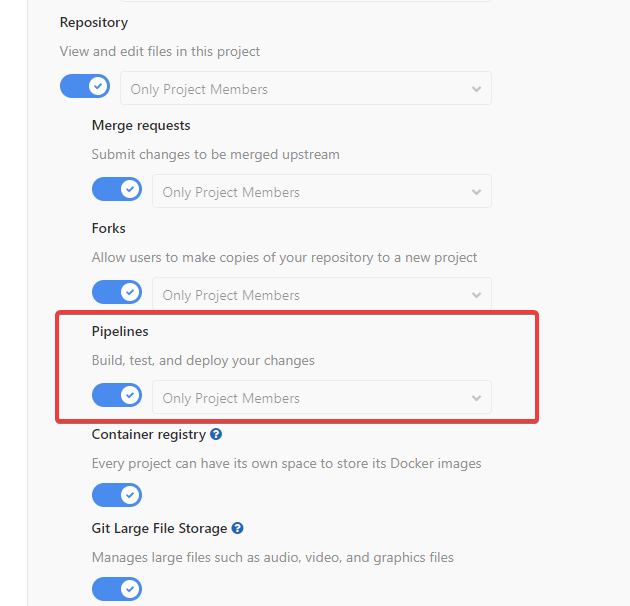
CI / CD. Settings -> CI / CD -> Runners
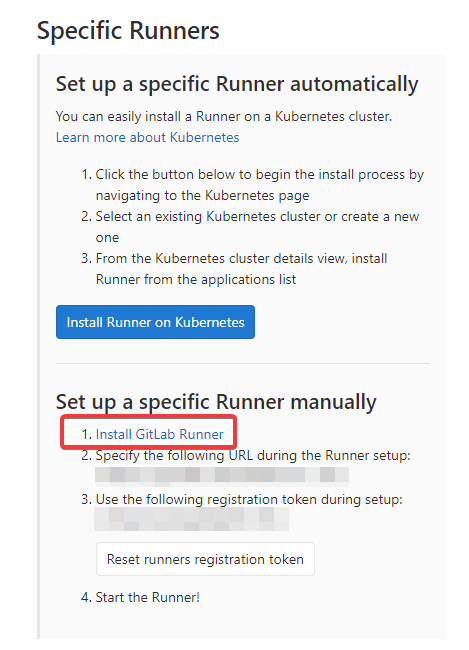
1 Gitlab Runner. .
Gitlab Runner
, . . .
- - , : C:\GitLab-Runner.
- x86 amd64 . gitlab-runner.exe.
- . ( powershell )
- . , () .
. , powershell, , . , , .
C:\gitlab_runners , gitlab-runner.exe
, :
- :
./gitlab-runner.exe register - url, 2. , :
https://gitlab.somesubdomain.com/ - 3. , :
tJTUaJ7JxfL4yafEyF3k - . UI . :
Runner on windows for autotests - , , .gitlab-ci.yml, . , .
docker, windows - , . docker
docker - image, .
.gitlab-ci.yml
python:3.8-alpine

, .
:
.\gitlab-runner.exe status
:
.\gitlab-runner.exe run
, Settings -> CI / CD -> Runners, - :
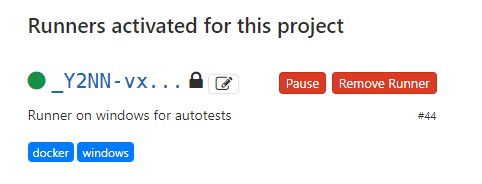
, . . .
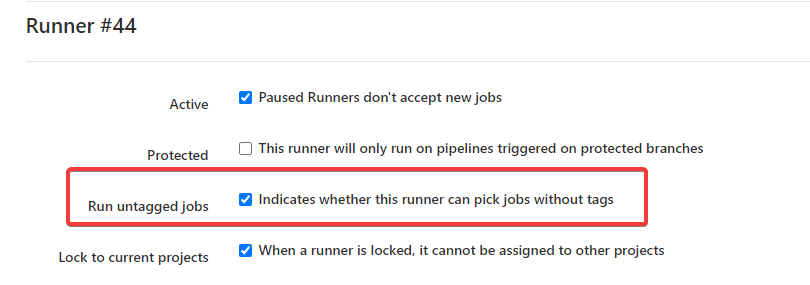
, .
.gitlab-ci.yml
.gitlab-ci.yml. .
stages. . 4. stage — job, .
stages:
- testing #
- history_copy #
- reports #
- deploy # gitlab pages. Testing
docker_job: # job
stage: testing # stage,
tags:
- docker # gitlab , . , , 6 .
image: python:3.8-alpine # , .
before_script:
- pip install -r requirements.txt #
script:
- pytest -n=4 --alluredir=./allure-results tests/test_dog_api.py # (-n=4 ), --alluredir=
allow_failure: true # , .
artifacts: # , , .
when: always #
paths:
- ./allure-results #
expire_in: 1 day # , . .. history_copy
history_job: # job
stage: history_copy # stage,
tags:
- docker #
image: storytel/alpine-bash-curl # , . , ?
script:
- 'curl --location --output artifacts.zip "https://( , gitlab.example.com)/api/v4/projects/( )/jobs/artifacts/master/download?job=pages&job_token=$CI_JOB_TOKEN"' # api job, . .
- apk add unzip # , unzip,
- unzip artifacts.zip #
- chmod -R 777 public #
- cp -r ./public/history ./allure-results #
allow_failure: true # , . .
artifacts:
paths:
- ./allure-results #
expire_in: 1 day
rules:
- when: always #
. reports
allure_job: # job
stage: reports # stage,
tags:
- docker #
image: frankescobar/allure-docker-service # allure. .
script:
- allure generate -c ./allure-results -o ./allure-report # ./allure-results ./allure-report
artifacts:
paths:
- ./allure-results #
- ./allure-report
expire_in: 1 day
rules:
- when: always
. deploy
pages: # job , pages
stage: deploy # stage,
script:
- mkdir public # public. gitlab pages public
- mv ./allure-report/* public # public .
artifacts:
paths:
- public
rules:
- when: always
.gitlab-ci.yml
stages:
- testing #
- history_copy #
- reports #
- deploy # gitlab pages
docker_job: # job
stage: testing # stage,
tags:
- docker # gitlab , . , , 6 .
image: python:3.8-alpine # , .
before_script:
- pip install -r requirements.txt #
script:
- pytest -n=4 --alluredir=./allure-results tests/test_dog_api.py # (-n=4 ), --alluredir=
allow_failure: true # , .
artifacts: # , , .
when: always #
paths:
- ./allure-results #
expire_in: 1 day # , . .
history_job: # job
stage: history_copy # stage,
tags:
- docker #
image: storytel/alpine-bash-curl # , . , ?
script:
- 'curl --location --output artifacts.zip "https://( , gitlab.example.com)/api/v4/projects/( )/jobs/artifacts/master/download?job=pages&job_token=$CI_JOB_TOKEN"' # api job, . .
- apk add unzip # , unzip,
- unzip artifacts.zip #
- chmod -R 777 public #
- cp -r ./public/history ./allure-results #
allow_failure: true # , . .
artifacts:
paths:
- ./allure-results #
expire_in: 1 day
rules:
- when: always #
allure_job: # job
stage: reports # stage,
tags:
- docker #
image: frankescobar/allure-docker-service # allure. .
script:
- allure generate -c ./allure-results -o ./allure-report # ./allure-results ./allure-report
artifacts:
paths:
- ./allure-results #
- ./allure-report
expire_in: 1 day
rules:
- when: always
pages: # job , pages
stage: deploy # stage,
script:
- mkdir public # public. gitlab pages public
- mv ./allure-report/* public # public .
artifacts:
paths:
- public
rules:
- when: always
, :
conftest.py-
tests requirements.txt(, ).gitlab-ci.yml
.
, . , . CI / CD -> Pipelines
, Ci , .gitlab-ci.yml.

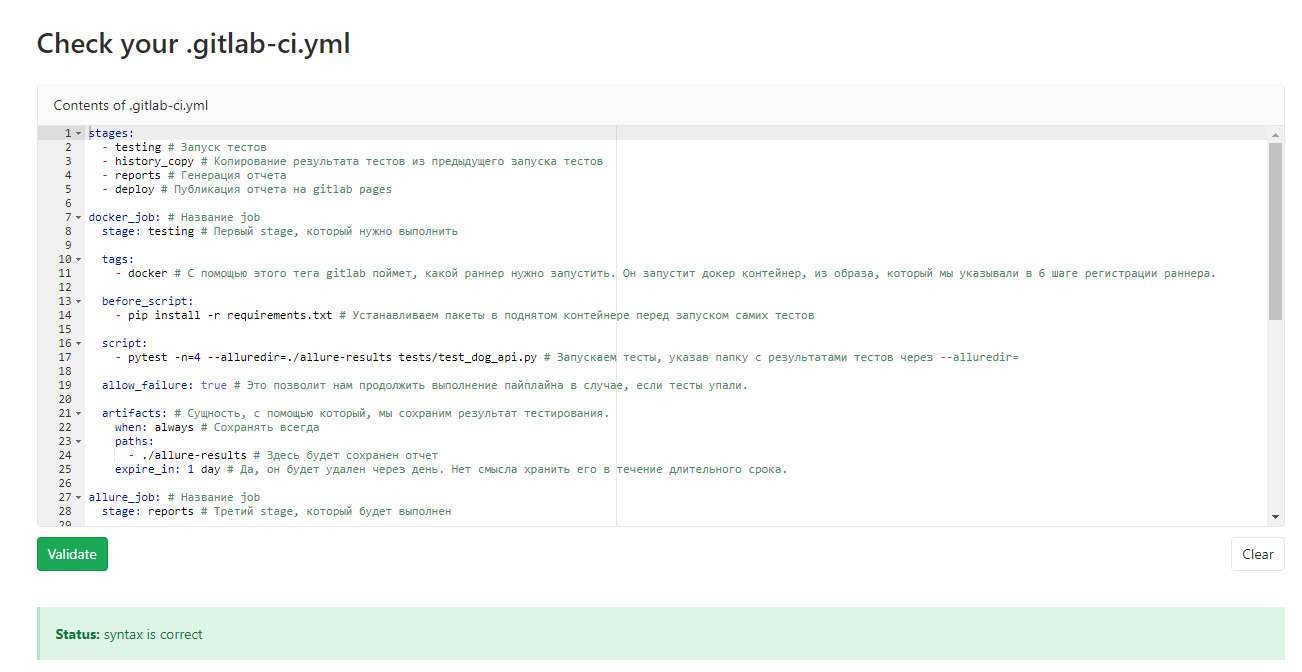
, Settings -> Pages. pages 30 . .
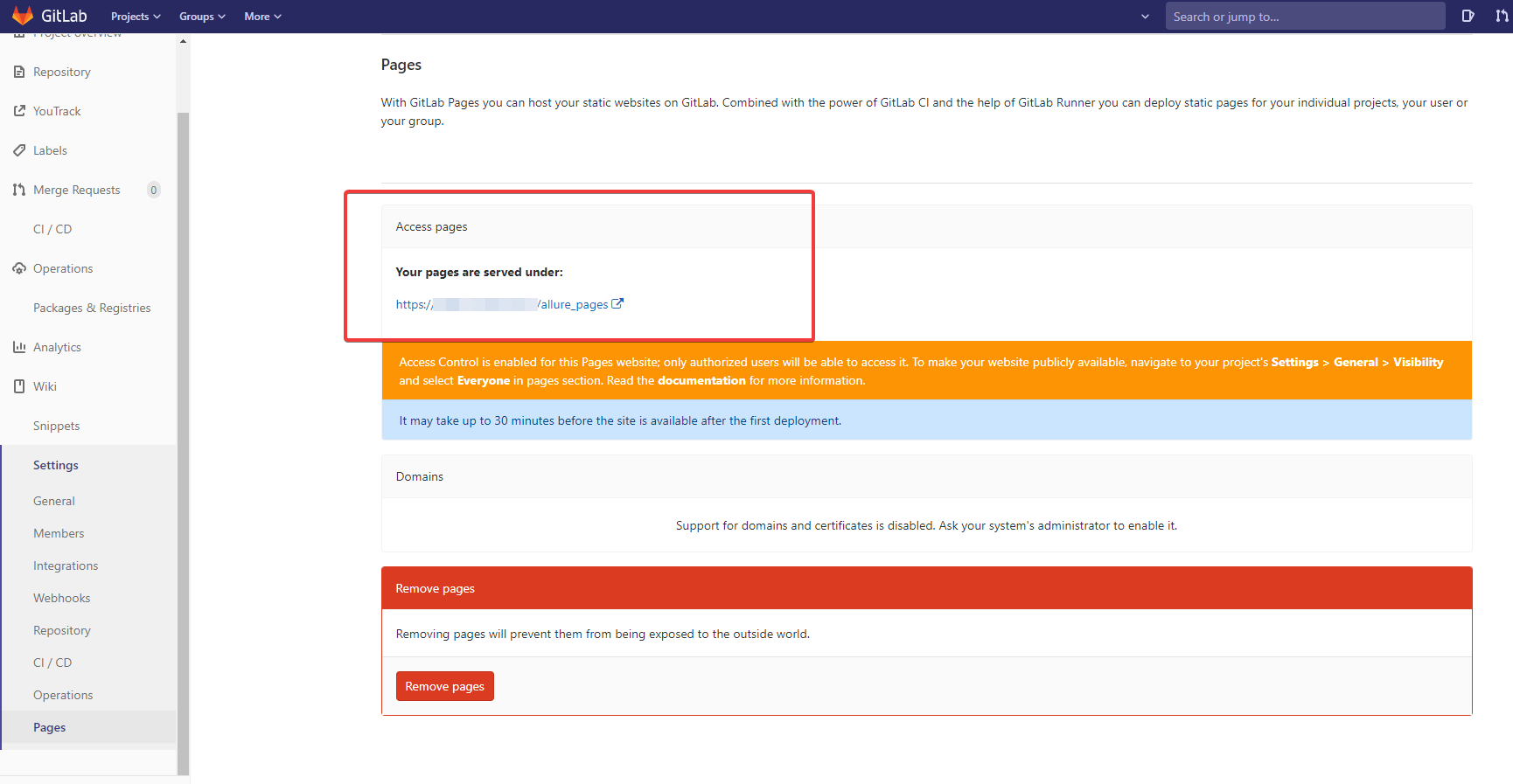
. .
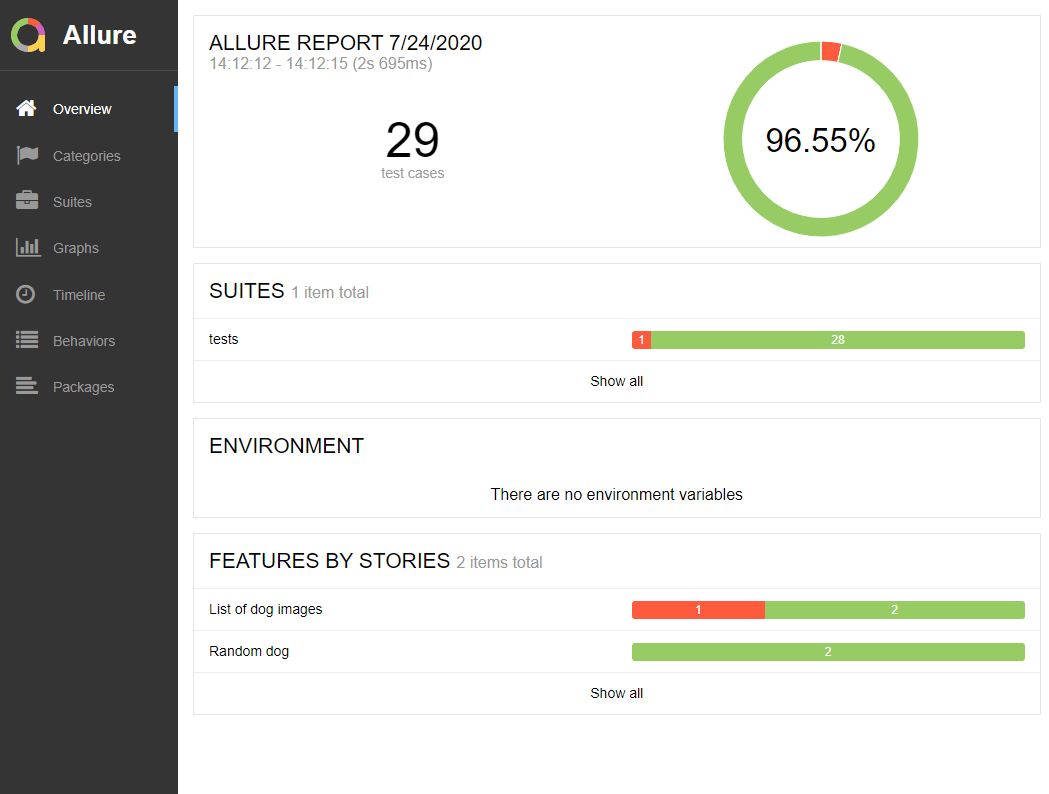
, , . .

. , stage history_job . .

, . .

UI
[services](https://docs.gitlab.com/ee/ci/services/). , script. UI job :
services:
- selenium/standalone-chrome:latest, url, - url, . :
-
: -
/__ -
/-( Gitlab Runner v1.1.0 )
executor ( chromedriver , ) ui :
browser = webdriver.Remote(command_executor="http://selenium__standalone-chrome:4444/wd/hub") , .gitlab-ci.yml:
selenium/standalone-chrome:latest
:
selenium__standalone-chrome
To run my tests, I got this job. If you add the following three jobs from the example with api tests to it, you can run all the tests and get a report.
chrome_job:
stage: testing
services:
- selenium/standalone-chrome
image: python:3.8
tags:
- docker
before_script:
- pip install -r requirements.txt
script:
- pytest --alluredir=./allure-results tests/
allow_failure: true
artifacts:
when: always
paths:
- ./allure-results
expire_in: 1 day
useful links
In addition to the links in the article, I would like to share a few more that can help in working with allure and gitlab ci.
An example of this project on gitlab
Link to reports after running tests
An article about allure on habr
Introduction to gitlab ci
UPD: Thanks to the commentators for pointing out the inaccuracies and incompleteness of this guide. I have corrected and added a link to the working repository